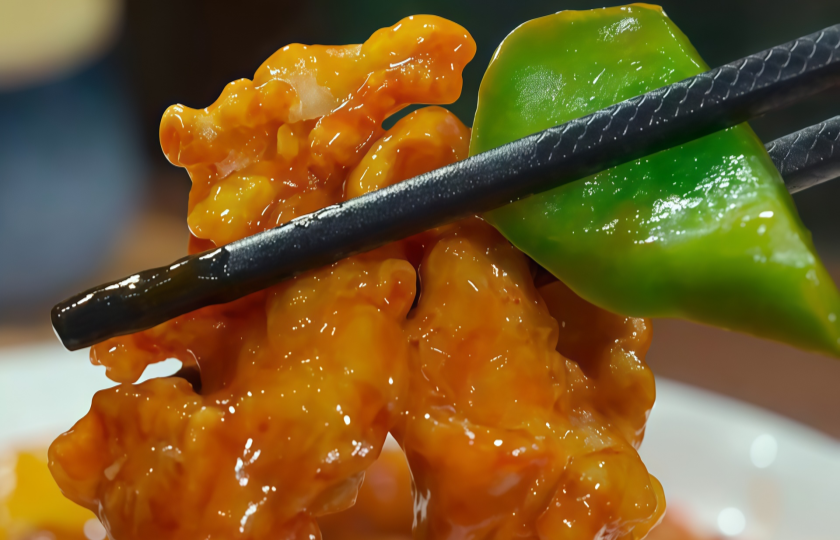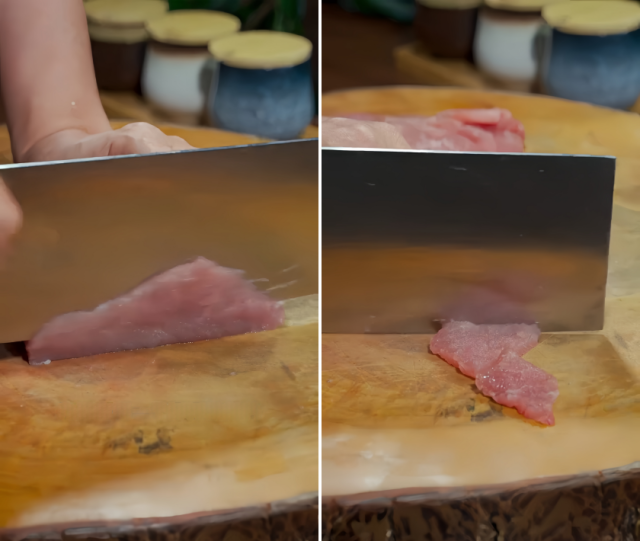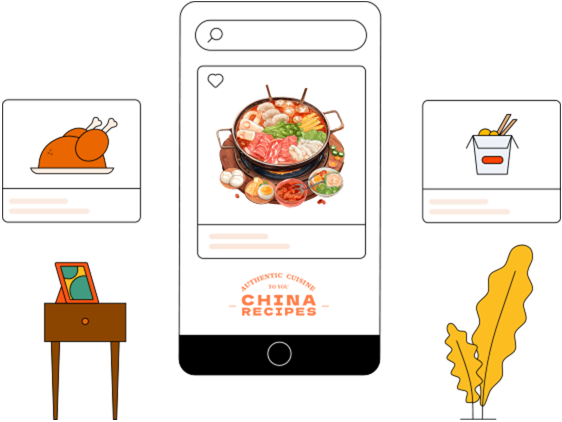Lychee-Style Sweet and Sour Pork

Among China's diverse culinary treasures, Fujian's Lychee-Style Sweet and Sour Pork stands out with its unique appearance and taste, resembling the beloved tropical fruit while delivering classic flavors.
Why Is This Dish Called Lychee-Style Sweet and Sour Pork?
The name of this dish comes from its shape. The pork slices are scored in a crosshatch pattern, then deep-fried until they curl up into a texture resembling the surface of a lychee.
After being coated with a shiny, sweet and sour sauce, they closely resemble freshly peeled lychees in both appearance and color, making them extremely appealing.
The outer layer of this dish is crispy, while the inner part is tender and juicy. The sauce is sweet and sour with a hint of garlic flavor. In the traditional recipe, water chestnuts (Chinese water chestnuts) are used to mimic the texture of the flesh of a lychee.
In this recipe, deep-fried potato chunks are a great alternative as they add a contrast of softness and crispness.

Main Ingredients and Substitution Instructions
Lean pork
You can also choose plum blossom meat or tenderloin with a thin layer of fat. The meat is tender and easy to score. Freeze it for half an hour before cutting to make it easier to get neat cuts.
Baijiu (Chinese Liquor)
It helps remove the fishy smell and adds aroma. You can use an equal amount of cooking wine or 1 teaspoon of rice wine as a substitute, but avoid using huangjiu (Chinese rice wine), as it tends to turn sour.
Egg Yolk
It makes the pork slices more golden and crispy. You can add the remaining egg white to the meat for marinating to avoid waste.
Sweet Potato Starch
It is more resistant to frying than regular starch, and the crispy crust is less likely to become soft. If you don't have sweet potato starch, you can use a 1:1 mixture of tapioca starch and corn starch as a substitute.
Potato
In traditional recipes, water chestnuts are often used. Potatoes are crispy on the outside and soft on the inside after frying, and are more filling. Soaking the potato chunks in water for 5 minutes after cutting can prevent oxidation and blackening.
Core Seasonings for the Sauce
Minced Garlic: Freshly minced garlic has the strongest flavor. If you want to save time, you can use garlic powder (1/4 teaspoon).
White Sugar + Balsamic Vinegar: They form the sweet and sour base of the sauce. It is recommended to use Zhenjiang balsamic vinegar or rice vinegar (white vinegar can be too sour).
Tomato Ketchup: It enhances the color and freshness of the sauce. If you use pure tomato paste, you need to add an extra 10 g of sugar.
Green and Red Bell Peppers
They are mainly used for coloring. You can choose non-spicy colored peppers. Alternatively, you can replace them with pineapple chunks to add a fruity, sweet and sour flavor.
Can this dish be prepared in advance?
Absolutely, it can be prepared in advance! Preparing the ingredients in stages makes the process easier:
①Marinate the meat in advance (without adding the starch). Seal it and refrigerate for up to 1 day.
②Deep-fry the potatoes until half-cooked, then store them in the refrigerator. Re-frying will make them crispier.
③Mix the sauce seasonings in advance (add the starch just before boiling it in water).
Note: Coating the meat with starch, frying the meat, and stir-frying the sauce must all be done right before cooking. Otherwise, the dish won't be crispy!
INGREDIENTS
Main Ingredients
-
·300g lean pork (cut into thick slices and make cross-hatch cuts)
Additional Ingredients
-
·200g potatoes (cut into chunks)
-
·50g green and red bell peppers (25g each, cut into chunks)
-
·20g minced garlic
Seasonings
-
·2g salt
-
·10 ml high-proof baijiu (Chinese liquor)
-
·1 egg yolk
-
·30g sweet potato starch
-
·800 ml cooking oil (for frying)
-
·Sauce
-
·2g salt
-
·50g white sugar
-
·50 ml balsamic vinegar
-
·40g tomato ketchup
-
·80 ml clear water
-
·10g starch + 20 ml clear water (mixed into a starch water)
COOKING STEP
Step 1
Cut the lean pork into thick slices and make cross-hatch cuts to form triangles.

Step 2
Put the cut lean pork in a bowl, add 2g salt and 10 ml baijiu, and mix well by hand.

Step 3
Then add 1 egg yolk and 30g sweet potato starch, and continue to mix well.

Step 4
You can add 10 ml clear water to adjust to a sticky state, and finally add 5 ml cooking oil to lock in the moisture.

Step 5
Prepare the minced garlic in a bowl, add 2g salt, 50g white sugar, 50 ml balsamic vinegar, 40g tomato ketchup and 80 ml clear water, then add 10g starch + 20 ml clear water mixed into a starch water and stir well.

Step 6
Put 200g potatoes into cold oil and stir-fry until 60 - 70% cooked, then remove and set aside.

Step 7
Pour a small half-pot of oil into the pot. When the oil temperature reaches 150℃, put the potatoes back into the pot and fry until golden and crispy, then remove and drain the oil.

Step 8
When the oil temperature reaches 160℃, put the marinated pork into the oil and fry until it takes shape, then turn to medium-low heat and fry until it floats up, then turn to high heat until the temperature reaches 180℃. Put the potatoes back just now and fry them again to make the surface crispier.

Step 9
Put 50g green and red bell peppers into the oil pan and fry for 10 seconds, then quickly remove.

Step 10
Leave 10 ml of oil in the pan, pour in the adjusted sauce and cook until it becomes sticky.

Step 11
Pour in the fried lychee-shaped pork, quickly stir-fry evenly to coat with the sauce, and finally add 5 ml cooking oil to enhance the luster.

Step 12
Serve on a plate. This Fujian-style Lychee-Style Sweet and Sour Pork, which is crispy on the outside and tender on the inside and has a sweet and sour taste, is done!

More recipes worth trying
Lunar New Year feast: General Tso's Chicken
Squirrel-Shaped Mandarin Fish: A Classic Dish for Chinese New Year's Eve Dinner
Distinctive Salted Egg Yolk Pumpkin Recipe
Mistakes to Avoid
Being Lazy When Scoring the Pork Slices
If the knife cuts are too shallow or the spacing between cuts is too wide, the pork slices will not easily curl into the shape of lychees after frying. It is recommended to cut the slices about 2/3 of their thickness. Crosshatch patterns about the width of a fingernail are the easiest to hold their shape.
Skipping the Oil Sealing Step When Marinating the Meat
If cooking oil is not added after coating the meat with sweet potato starch, the starch coating may easily come off during frying. The 5 ml of oil poured at the end can lock in the moisture and keep the crispy crust more intact.
Taking the Potatoes Out of the Pan After Frying Only Once
If you skip the first half-cooked frying step and directly fry the potatoes at high temperature, the outside will burn while the inside remains raw. Frying in two steps can ensure that the inside is soft and the outside is crispy without being tough.
Overcooking the Sauce
After adding the starch water to the pan, it is necessary to stir quickly. Cooking for too long will make the sauce turn into a gummy state. The ideal state is that the sauce slightly clings to the spoon, and it can just coat the meat chunks after cooling.
Putting All the Ingredients Back into the Pan Together
If the green and red bell peppers are put into the sauce too early, they will release water, causing the crispy crust to soften. Put them in during the last 10 seconds so that they can pick up the flavor while maintaining their crispness.
Key Details
If the oil temperature is not high enough when re-frying the meat chunks: The meat will absorb more oil and is likely to become soft again.
Using an iron pan to cook the sauce: It is prone to blackening. It is recommended to use a non-stick pan instead.
Pouring the sauce directly instead of stir-frying: The sauce will not coat the meat evenly, resulting in a flavor layer separation between the inside and outside of the meat.
Eating Combinations
Recommended Staple Foods
It is recommended to serve with white rice or fried rice. The sweet and sour sauce blends well with the rice, achieving a balanced taste. If you prefer noodles, you can pair it with thin noodles. Just drizzle a little sauce and mix well.
Soup Selections
Light soups are more suitable, such as kelp and tofu soup or winter melon and spareribs soup, to avoid flavor conflicts. If you want to highlight the characteristics of Fujian cuisine, you can pair it with Fuzhou fish ball soup.
Side Dish Combinations
Cold Cucumber Slices: Crispy and refreshing, helping to relieve greasiness.
Stir-Fried Seasonal Vegetables: Such as Chinese kale or bok choy, which can supplement dietary fiber.
Combinations for Entertaining Guests
Serve it together with fresh-tasting dishes like steamed fish and blanched shrimp. The sweet and sour flavor can enliven the overall flavor levels of the table.
Making It in an Air Fryer
Meat Preparation
The marinating steps remain the same. After coating with starch, brush a thin layer of oil on the surface and spread the meat evenly in the air fryer basket without overlapping. First, fry at 180°C for 8 minutes, then turn it over and fry for another 5 minutes. Finally, fry at 200°C for 2 minutes to make it crispier.
Potato Adjustments
After cutting the potatoes into chunks, spray them with oil and fry at 180°C for 12 minutes (turn them over halfway through), omitting the pre-frying step.
Sauce Precautions
Stir-fry the green and red bell peppers over low oil for 10 seconds. Immediately coat the meat with the cooked sauce as soon as it comes out of the air fryer to avoid getting damp after standing for a long time.
Advantages and Disadvantages
The crust is drier and less oil is used, but the meat texture is slightly firmer. You can add 5 ml more water or 1 spoon of egg white when marinating the meat to make up for it. It is suitable for making 1 - 2 servings. Don't put more than two layers of meat slices in the air fryer basket at a time.
FAQs:
When coating the meat with sweet potato starch, it is recommended to add clear water to adjust it to a thick paste-like consistency so that the coating is of uniform thickness. Finally, mix in cooking oil to lock in the moisture, which will make the outer crust more fluffy and crispy.
For tenderloin, cut it into thin slices against the grain to make the meat more tender and soft; plum meat comes with an appropriate amount of fat, providing a more moist texture.
If you use lean meat only, add 5 ml more egg white or clear water during marinating to prevent the meat from becoming too dry after frying. Just follow the steps to control the heat.
Put them into the hot oil and quickly blanch them (about 10 seconds). This can remove the raw taste while maintaining a crispy texture. After being fished out, they still retain their bright green color.
Before eating, reheat and fry them in an air fryer at 180°C for 3 minutes, then reheat the sauce and coat the meat evenly. This will make the taste closer to freshly made. If the meat is already coated with sauce, it can be refrigerated, but reheating may cause it to wilt. It is recommended to finish eating it as soon as possible!

















